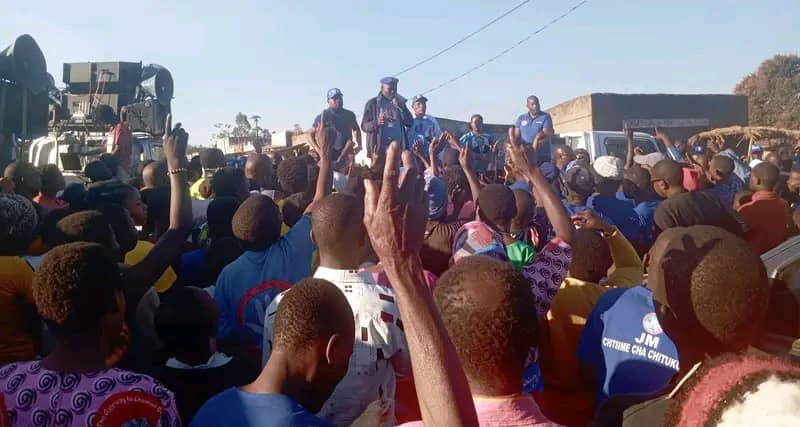By Burnett Munthali
The Democratic Progressive Party’s Blue Alliance made a strong case for youth empowerment during whistle-stop tours in Chiradzulu Thumbwe Constituency.
Director of Youth-South, Hon. Bizzier Kalulu, delivered a spirited message to young people in the area, emphasizing that their future lies with the leadership of Professor Arthur Peter Mutharika.
Kalulu announced that Mutharika has already set aside a substantial 100 million kwacha development fund for every constituency.
This fund, he explained, will be directed towards boosting local businesses, particularly those run by young people in their communities.
He further pledged that the DPP government under Mutharika will continue its investment in education and skills training.
In his address, Kalulu said that more technical colleges will be established across different constituencies to provide youths with practical skills in various trades.
These institutions, he stressed, will enable young Malawians to acquire hands-on expertise in carpentry, welding, tailoring, mechanics, and other critical fields.
Kalulu argued that by equipping youths with technical knowledge, the nation can empower them to create jobs, grow businesses, and contribute meaningfully to national development.
He appealed to the electorate in Chiradzulu Thumbwe to cast their votes wisely on September 16.
Kalulu urged them to rally behind President Arthur Peter Mutharika, parliamentary candidate Hon. Joseph Mwanamvekha, and all DPP councillors.
He strongly warned against wasting votes on independent candidates, insisting that only a strong DPP team can deliver development projects to the community.
Kalulu concluded by urging voters to protect their future by voting for continuity and collective progress through the DPP.
The DPP’s emphasis on youth programs is not new.
During Arthur Peter Mutharika’s first term (2014–2020), his government launched a drive to expand technical and community colleges across Malawi.
These colleges were designed to provide vocational training to thousands of young people who had completed secondary school but lacked access to universities.
The initiative was hailed as a bold step towards equipping the youth with practical skills for self-employment and entrepreneurship.
Graduates from these colleges went on to start small-scale businesses in mechanics, carpentry, tailoring, and bricklaying, among other trades.
The program was popular among rural communities, where access to tertiary education had long been limited.
However, critics argued that while the colleges offered valuable training, they often suffered from inadequate funding, limited equipment, and a mismatch between skills taught and the actual job market.
Nevertheless, the initiative remains one of the DPP’s most visible legacies in youth empowerment and skills development.
By revisiting this agenda and promising to expand it further, the party is signaling continuity while attempting to correct past shortcomings.
By contrast, under the current administration, youth unemployment has continued to rise.
Reports indicate that many young Malawians struggle to find formal employment, while technical colleges remain underfunded and in some cases, ill-equipped to meet modern vocational demands.
Subsidies for skills development programs have been reduced, limiting the number of students who can access technical training.
Additionally, the lack of targeted youth funding has slowed the growth of small businesses run by young entrepreneurs, leaving many without the capital to expand operations.
These challenges have contributed to a sense of frustration among the youth, particularly in rural areas where job opportunities are scarce.
In Chiradzulu, 24-year-old Peter Banda completed secondary school two years ago but has been unable to find formal employment.
Despite his carpentry skills, he cannot access affordable tools or a workshop to start a business, leaving him idle and financially dependent.
Similarly, 22-year-old Grace Phiri, trained in tailoring at a local community college, struggles to sell her designs because there is no government support or access to start-up capital.
Many young farmers also report that fertilizer shortages and high costs prevent them from planting sufficient crops, forcing them into seasonal labor with low wages.
These stories highlight the real economic pressures facing Malawian youth under the current administration and underscore why the DPP is emphasizing practical support, funding, and skills training.
By highlighting these gaps, the DPP is positioning its 100 million kwacha per constituency fund and expansion of technical colleges as a clear alternative that directly addresses young people’s economic and educational needs.
Concluding Analysis
The DPP’s Blue Alliance message in Chiradzulu Thumbwe reflects a deliberate strategy of targeting the youth vote through promises of financial empowerment and technical education.
By focusing on a 100 million kwacha development fund per constituency and the expansion of technical colleges, the party is positioning itself as the champion of youth-driven economic growth.
The reference to technical colleges ties today’s promises to Mutharika’s earlier track record, reminding voters of what the DPP has already delivered while highlighting a plan for expansion.
Direct comparisons with the current administration’s underperformance in youth employment and education funding, combined with real-life anecdotes, make the DPP’s promises more relatable and urgent.
However, the emphasis on voting strictly for DPP candidates reveals the party’s concern over independent challengers fragmenting its support base.
If these promises are backed by credible implementation frameworks—and lessons learned from past challenges—they could resonate deeply with young voters eager for opportunity.
But if not, they risk being dismissed as mere campaign rhetoric.
Ultimately, the September 16 elections will test whether this youth-focused message can translate into sustained loyalty for the DPP in Chiradzulu Thumbwe and beyond.




